Some of the most influential voices in US policy on Tibet and China gave young Tibetan Americans firsthand insight into the American political process last week as part of an International Campaign for Tibet program.
ICT’s Tibetan Youth Leadership Program brought together 10 outstanding Tibetan American college and graduate students from across the United States for a weeklong virtual training on advocacy and policymaking.
The program featured an impressive roster of guest speakers, including two sitting members of Congress, two representatives of the Dalai Lama, the leading candidate for mayor of Cincinnati, a journalist from The Washington Post and CNN, and a panel of Tibetan Americans who have succeeded in public service.
The students also met with State Department and Congressional staff and leaders of Washington, DC-based NGOs.
On the final day of the program, they spoke with a Tibetan torture survivor and ICT Chairman Richard Gere.
“Through our virtual Tibetan Youth Leadership Program, our participants received vital political training for their development as the next generation of Tibetan American community leaders,” program coordinator and ICT Interim Vice President Tencho Gyatso said. “ICT wishes to thank the incredible guest speakers who made this year’s program a success, as well as the amazing Tibetan American youth leaders who worked hard throughout the week and showed that the future of the Tibetan cause in this country is in good hands.”
Weeklong program
The program featured five days of trainings, workshops and discussions.
Day 1
The program began with a video message from Ngodup Tsering, the Dalai Lama’s representative to North America, in which he highlighted the opportunities and challenges before the Tibetan American community.
The theme of day one, Monday, June 21, was the “Tibet Movement and You.” It began with a talk about Tibetan activism and public diplomacy in the US, featuring ICT Interim President Bhuchung K. Tsering.
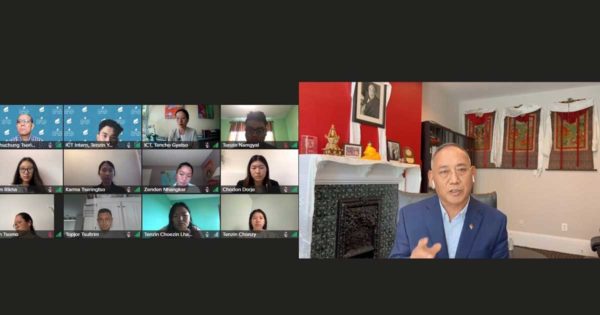
Ngodup Tsering, the Dalai Lama’s representative to North America (right)
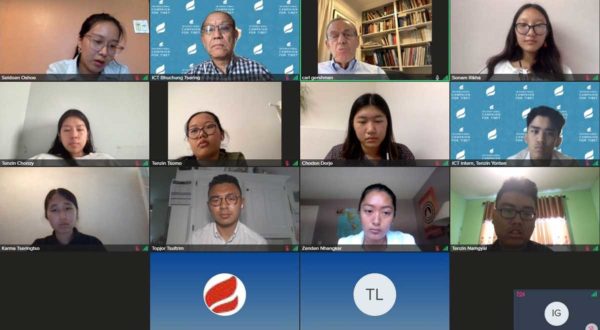
National Endowment for Democracy President Carl Gershman (top row, second from right)
Later in the afternoon, the students heard from Carl Gershman, the longtime president of the National Endowment for Democracy and met with Aftab Pureval, a US politician of Tibetan and Indian descent who is a mayoral candidate in Cincinnati.
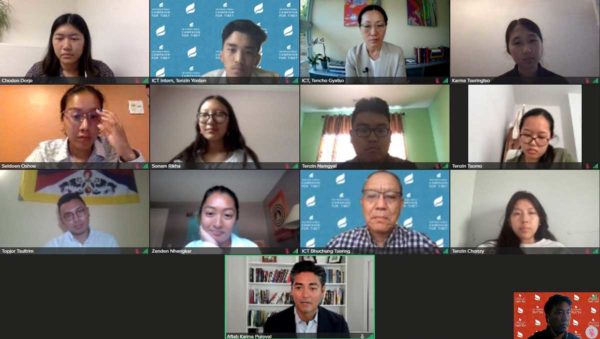
Aftab Pureval, a US politician of Tibetan and Indian descent who is the leading candidate for mayor of Cincinnati (bottom center)
Day 2
Tuesday, June 22, was all about “Advocacy and Human Rights.” It began with remarks by Kasur Tempa Tsering, director, India and East Asia, in the Office of His Holiness the Dalai Lama and a member of ICT’s Board of Directors. He gave them an overview of the Tibetan issue and the vision of the Dalai Lama.
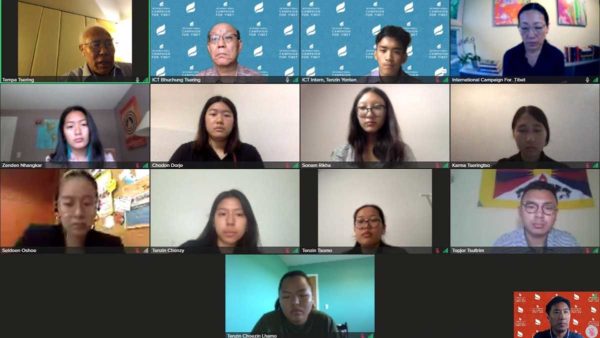
Kasur Tempa Tsering, director, India and East Asia, in the Office of His Holiness the Dalai Lama and member of ICT’s Board of Directors (top left)
Afterward, ICT Interim President Tencho Gyatso, Director of Government Relations Franz Matzner and Advocacy Officer John N. led an advocacy workshop for the students. Following that, the students met with Sophie Richardson, China director of Human Rights Watch, and Annie Boyajian, director of advocacy at Freedom House, who spoke about role of civil society in advocacy.
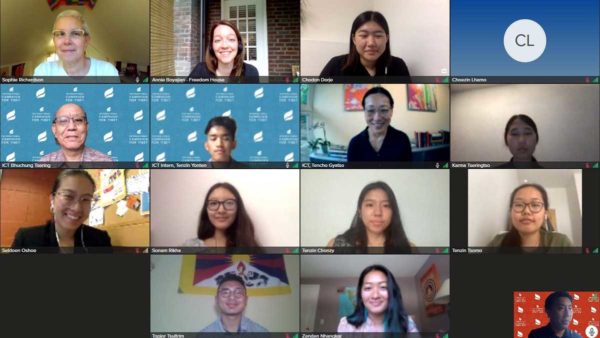
Sophie Richardson, China director of Human Rights Watch, and Annie Boyajian, director of advocacy at Freedom House (top left)
The day wound down with Josh Rogin, a columnist for The Washington Post and author of the new book, “Chaos Under Heaven: Trump, Xi, and the Battle for the Twenty-First Century.”
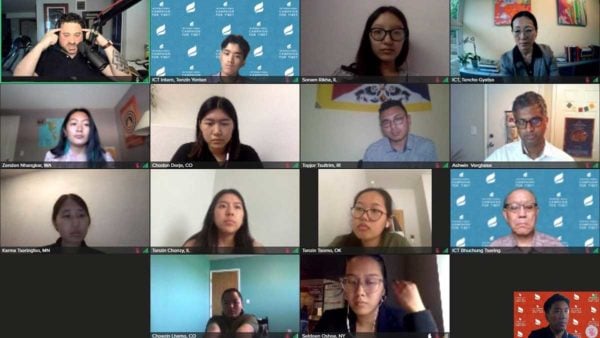
Washington Post Columnist and CNN Political Analyst Josh Rogin (top left)
Day 3
Wednesday, June 23, focused on “Congress and Tibet.” The students had multiple meetings with Congressional staff and offices, highlighted by their meetings with two important Congressional leaders: Rep. James McGovern, D-Mass., and Andy Levin, D-Mich.
McGovern is the co-chair of both the Congressional-Executive Commission on China and the Tom Lantos Human Rights Commission.
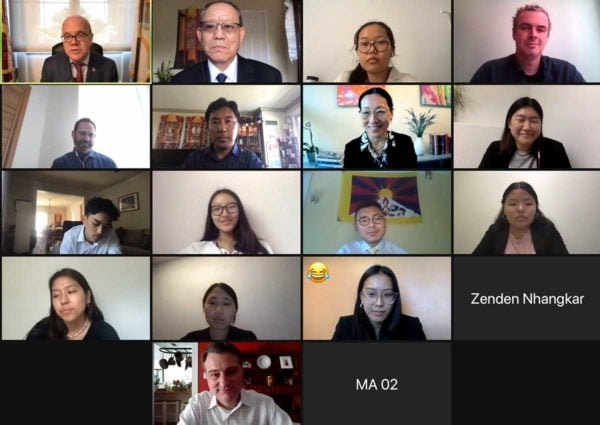
Rep. James McGovern of Massachusetts (top left)
Levin, a member of the House Foreign Affairs Committee, is a longtime friend of Tibet, having visited the country in the 1980s, studied at the Central Institute for Higher Tibetan Studies in India.
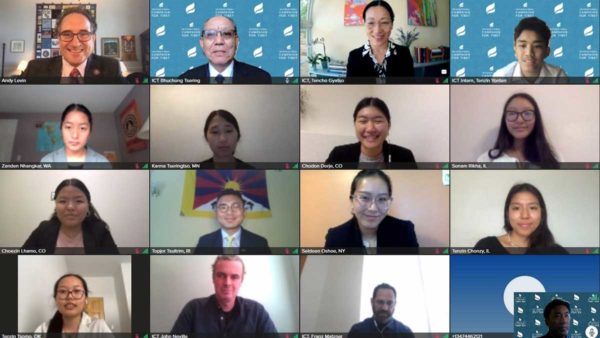
Rep. Andy Levin of Michigan (top left)
Day 4
The main portion of Thursday, June 24, centered around the US State Department. Department staff had several meetings and sessions with the students, including a simulation session organized by the State Department Diplomacy Center to resolve a diplomatic problem between two fictitious countries.
In the evening, there was also a panel discussion with Tibetan Americans who had participated in past TYLPs and subsequently had stints in public service. The panel included Dr. Tenzin Jangchup, an officer in the United States Public Health Service, Nima Binara, who worked in Congress and the Administration before joining Google, and Tashi Chogyal, who had served in the Administration and has also worked in the Obama campaign.
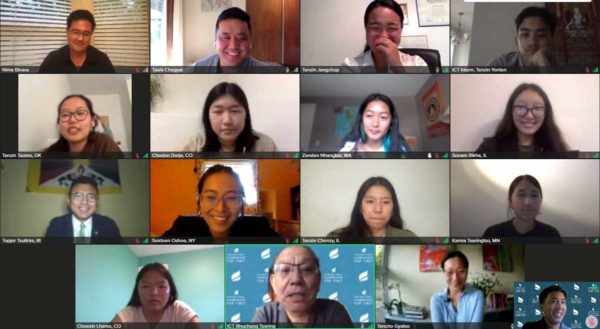
A panel discussion with Tibetan Americans who have succeeded in public service
Day 5
The final day of the program, Friday, June 25, was an opportunity for reflection, review and discussion. The students began the day by facilitating a talk about the week and their recommendations for future versions of the program.
In the afternoon, the students also got a special treat: a visit from ICT Chairman Richard Gere, the world-famous actor, social activist and philanthropist.
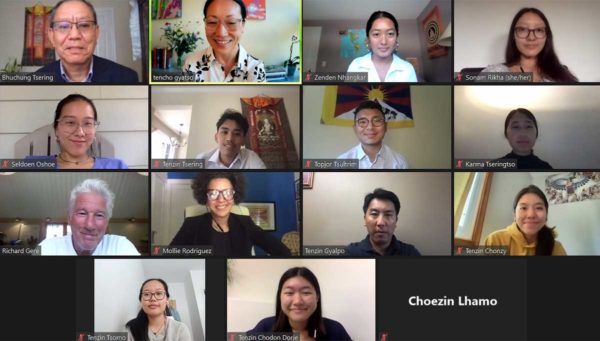
ICT Chairman Richard Gere, the world-famous actor, social activist and philanthropist
The students also had a poignant session with Ngawang Sandrol, a Tibetan torture survivor who took part last week in ICT’s End Tibet Torture campaign.
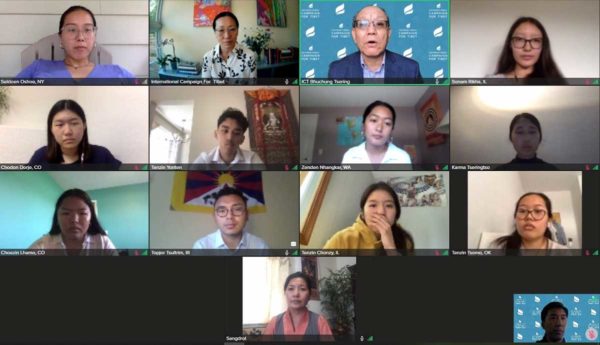
Tibetan torture survivor Ngawang Sangdrol
Student reaction
The 10 Tibetan Americans who participated in the program are: Tenzin Chonzy of New York University; Tenzin C Dorje of the University of Colorado; Tenzin Lhamo of the University of Iowa; Zenden Nhangkar of Western Washington University; Seldoen Oshoe of Cornell University; Sonam Rikha of Pomona College; Karma Tsering Tso of Saint Catherine; Tenzin Tsomo of the University of Oklahoma; Topjor Tsultrim of Williams College; and Tenzin Yonten of George Mason University (TYLP intern).
As the program ended, the students expressed their appreciation for the opportunities they had.
“I really enjoyed this because I was able to hear from people in various parts or sectors in public service and their relation to advocacy and Tibet. That was something I really valued,” said Rikha, noting that her favorite part of the program was the session with Sophie Richardson of Human Rights Watch and Annie Boyajian of Freedom House.
Coming from a small Tibetan community, Rikha said another aspect of the program she loved was getting to meet other Tibetan Americans from states where she didn’t even know Tibetans lived.
Lhamo said she enjoyed hearing from Tenzin Jangchup, the US Public Health Service officer, during the panel discussion with Tibetan Americans in public service.
“Before she told us about her job, I didn’t know that things like that existed,” said Lhamo, who’s in school for health and human psychology and hopes to incorporate public service into her career.
Tsultrim said it was heartwarming to see how speakers like Pureval, the Cincinnati mayoral candidate, and McGovern and Levin, the two members of Congress, were genuinely enthusiastic to interact with the students.
“For me, the most significant strength of this program was how ICT is able to use its connections and networks to bring all these speakers together,” Tsultrim said.

